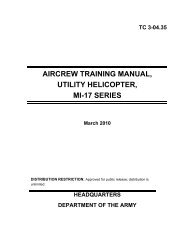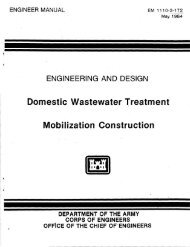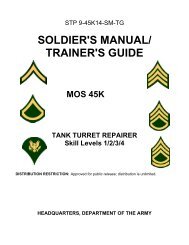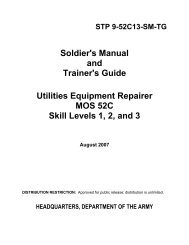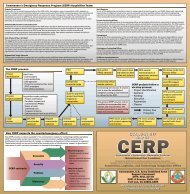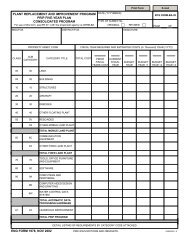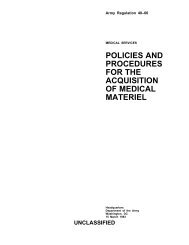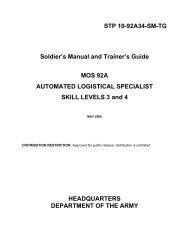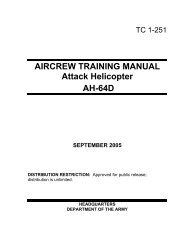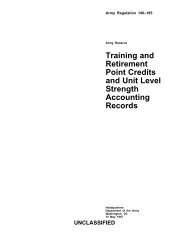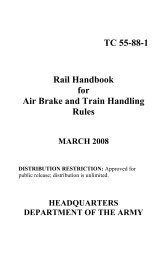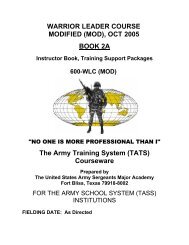- Page 1 and 2:
STP 21-1-SMCT HEADQUARTERS DEPARTME
- Page 3 and 4:
*STP 21-1-SMCT Soldier Training Pub
- Page 5 and 6:
081-831-0101 Request Medical Evacua
- Page 7 and 8:
071-326-0503 Move Over, Through, or
- Page 9 and 10:
Preface This manual is one of a ser
- Page 11 and 12:
Chapter 1 Introduction to the SMCT
- Page 13 and 14:
. Plan the training. Plan individua
- Page 15 and 16:
1-7. TRAINING TIPS FOR NCO LEADERS
- Page 17 and 18:
Chapter 2 Training Guide 2-1. THE A
- Page 19 and 20:
Task Number Army Warrior Training P
- Page 21 and 22:
Task Number Army Warrior Training P
- Page 23 and 24:
Chapter 3 Warrior Skills Level 1 Ta
- Page 25 and 26:
Performance Steps 2. Point the weap
- Page 27 and 28:
Performance Steps Note: If the weap
- Page 29 and 30:
Evaluation Preparation: Setup: On a
- Page 31 and 32:
References Required: Related: FM 3-
- Page 33 and 34:
Performance Steps d. Align the sigh
- Page 35 and 36:
Performance Measures GO NO GO 6. Co
- Page 37 and 38:
Performance Steps (7) Attach the mo
- Page 39 and 40:
071-100-0042 Zero an AN/PAQ-4-Serie
- Page 41 and 42:
Performance Steps b. Implement corr
- Page 43 and 44:
Performance Steps b. Remove the rai
- Page 45 and 46:
Performance Steps c. Fire on the ta
- Page 47 and 48:
(LBE); modular, lightweight, load-b
- Page 49 and 50:
Performance Steps 3. Inspect the ha
- Page 51 and 52:
Performance Measures GO NO GO d. Ch
- Page 53 and 54:
Performance Steps f. Throw the gren
- Page 55 and 56:
Performance Steps c. Assume your po
- Page 57 and 58:
Performance Steps Note: Outdoor mov
- Page 59 and 60:
Performance Steps 4. Move around co
- Page 61 and 62:
Performance Measures GO NO GO 3. Mo
- Page 63 and 64:
Performance Steps Figure 071-329-10
- Page 65 and 66:
Performance Steps 071-329-1001-2. U
- Page 67 and 68:
Performance Steps Figure 071-329-10
- Page 69 and 70:
Performance Steps Table 071-329-100
- Page 71 and 72:
Performance Steps c. Identify a val
- Page 73 and 74:
Performance Steps b. Identify a spu
- Page 75 and 76:
Performance Steps Figure 071-329-10
- Page 77 and 78:
Performance Steps g. Determine if t
- Page 79 and 80:
Performance Steps 3. Determine poin
- Page 81 and 82:
Performance Steps Figure 071-329-10
- Page 83 and 84:
Evaluation Guidance: Refer to chapt
- Page 85 and 86:
Evaluation Preparation: Setup: Prov
- Page 87 and 88:
Performance Steps Note: Effects of
- Page 89 and 90:
Performance Measures GO NO GO 1. In
- Page 91 and 92:
071-329-1030 Navigate from One Poin
- Page 93 and 94:
References Required: GTA 05-02-012
- Page 95 and 96:
Performance Steps c. Select your ne
- Page 97 and 98:
Performance Steps l. Engage the ene
- Page 99 and 100:
Performance Steps d. Cross under a
- Page 101 and 102:
and dangers to avoid injury to pers
- Page 103 and 104:
071-410-0002 React to Direct Fire w
- Page 105 and 106:
Performance Steps 3. Maintain camou
- Page 107 and 108:
Performance Measures GO NO GO 3. En
- Page 109 and 110:
Performance Measures GO NO GO 1. En
- Page 111 and 112:
Table 081-831-0101-1. Line numbers
- Page 113 and 114:
Evaluation Preparation: Setup: Eval
- Page 115 and 116:
Performance Steps 2. Send the SITRE
- Page 117 and 118:
Performance Steps f. LINE 6 - unit
- Page 119 and 120:
Performance Steps c. The name and c
- Page 121 and 122:
Performance Steps Figure 071-326-06
- Page 123 and 124:
Performance Steps Figure 071-326-06
- Page 125 and 126:
Performance Steps Figure 071-326-06
- Page 127 and 128:
Performance Steps Figure 071-326-06
- Page 129 and 130:
Performance Steps Figure 071-326-06
- Page 131 and 132:
Performance Steps Figure 071-326-06
- Page 133 and 134:
Performance Steps Figure 071-326-06
- Page 135 and 136:
Subject Area 4: Survive 031-503-103
- Page 137 and 138:
SPECIAL CONDITIONS Do not wear cont
- Page 139 and 140:
Performance Steps Note: If you have
- Page 141 and 142:
031-503-1019 React to Chemical or B
- Page 143 and 144:
Performance Steps j. Secure the DAP
- Page 145 and 146:
Standards: Protect yourself from CB
- Page 147 and 148:
Performance Steps 4. Doff the JSLIS
- Page 149 and 150:
protective gloves, chemical protect
- Page 151 and 152:
Performance Steps b. Use any remain
- Page 153 and 154:
Performance Steps (e) Scrub across
- Page 155 and 156:
Brief Soldier: Tell the Soldier wha
- Page 157 and 158:
Performance Steps c. Blot (do not r
- Page 159 and 160:
Performance Steps b. Emplace the bi
- Page 161 and 162:
NBC markers are well placed and tha
- Page 163 and 164:
Performance Steps a. Form a general
- Page 165 and 166:
Performance Steps 3. Monitor an unc
- Page 167 and 168:
Performance Steps b. If the casualt
- Page 169 and 170:
Performance Steps d. Thirst. e. Sev
- Page 171 and 172: 081-831-1023 Perform First Aid to R
- Page 173 and 174: Performance Steps f. Take appropria
- Page 175 and 176: Performance Steps (3) Continue unti
- Page 177 and 178: Performance Measures GO NO GO 10. R
- Page 179 and 180: Performance Steps (7) Apply manual
- Page 181 and 182: Performance Steps (c) If the wound
- Page 183 and 184: Performance Measures GO NO GO b. To
- Page 185 and 186: Performance Steps b. Air ambulance.
- Page 187 and 188: Performance Steps 1. Remove a casua
- Page 189 and 190: Performance Steps (3) Loop the casu
- Page 191 and 192: Performance Measures GO NO GO 1. Re
- Page 193 and 194: Performance Steps CAUTION Do not pl
- Page 195 and 196: Performance Steps 6. Open interior
- Page 197 and 198: Performance Measures GO NO GO d. Un
- Page 199 and 200: Performance Steps Note: Slow scan s
- Page 201 and 202: Performance Steps c. Use off-center
- Page 203 and 204: Performance Measures GO NO GO 2. Dr
- Page 205 and 206: Performance Steps (c) The rear clin
- Page 207 and 208: Performance Steps Figure 071-000-00
- Page 209 and 210: Performance Steps e. Escape the mou
- Page 211 and 212: Performance Steps (1) Open his/her
- Page 213 and 214: Performance Measures GO NO GO 1. At
- Page 215 and 216: Performance Steps 6. Establish and
- Page 217 and 218: Performance Steps j. Describe the p
- Page 219 and 220: Performance Steps e. Describe human
- Page 221: Performance Steps (j) Describe whet
- Page 225 and 226: Performance Measures GO NO GO e. De
- Page 227 and 228: Performance Measures GO NO GO d. De
- Page 229 and 230: Performance Measures GO NO GO (e) D
- Page 231 and 232: Performance Measures GO NO GO (q) D
- Page 233 and 234: Performance Measures GO NO GO 7. De
- Page 235 and 236: Performance Steps 3. Article III st
- Page 237 and 238: Performance Measures GO NO GO 4. Co
- Page 239 and 240: Performance Steps b. Perform Step 2
- Page 241 and 242: Performance Steps (7) Grasp the ins
- Page 243 and 244: Performance Steps 3. Know the guide
- Page 245 and 246: Performance Steps 5. Identify cultu
- Page 247 and 248: Performance Measures GO NO GO 4. Id
- Page 249 and 250: Performance Steps (4) Standard of l
- Page 251 and 252: Performance Measures GO NO GO 1. Id
- Page 253 and 254: Performance Steps 4. Strive for exc
- Page 255 and 256: Performance Steps h. Develop positi
- Page 257 and 258: 071-326-3002 React to Indirect Fire
- Page 259 and 260: Evaluation Preparation: Setup: Prov
- Page 261 and 262: Performance Steps c. Ensure that th
- Page 263 and 264: the local standing operating proced
- Page 265 and 266: Performance Steps (3) Foreign items
- Page 267 and 268: Performance Steps (5) Secure the sc
- Page 269 and 270: Performance Steps 1. Comply with no
- Page 271 and 272: 5. Determine if the vehicle and occ
- Page 273 and 274:
Performance Measures GO NO GO 8. St
- Page 275 and 276:
7. If a target can be identified, b
- Page 277 and 278:
7. When water entry is imminent (wh
- Page 279 and 280:
Performance Measures GO NO GO g. Ob
- Page 281 and 282:
Performance Measures GO NO GO (5) U
- Page 283 and 284:
Performance Measures GO NO GO 1. Co
- Page 285 and 286:
with the required normal operation
- Page 287 and 288:
Performance Steps 3. Configure armo
- Page 289 and 290:
Performance Measures GO NO GO a. En
- Page 291 and 292:
Appendix Proponent School or Agency
- Page 293 and 294:
School Code Table A-1. Proponent Sc
- Page 295 and 296:
Glossary ACH AIDS AIT ALM AN ANCOC
- Page 297 and 298:
IOTV improved outer tactical vest I
- Page 299 and 300:
STP T&E TC TCCC TGN TIM TM TOE TRAD
- Page 301 and 302:
References REQUIRED PUBLICATIONS Re
- Page 303 and 304:
TM 3-6665-307-10. Operator's Manual
- Page 305 and 306:
FM 22-6. Guard Duty. 17 September 1
- Page 307 and 308:
TM 11-5855-308-12&P. Operator's and
- Page 309 and 310:
STP 21-1-SMCT 2 May 2011 By Order o
- Page 311 and 312:
WARRIOR ETHOS The Warrior Ethos for



